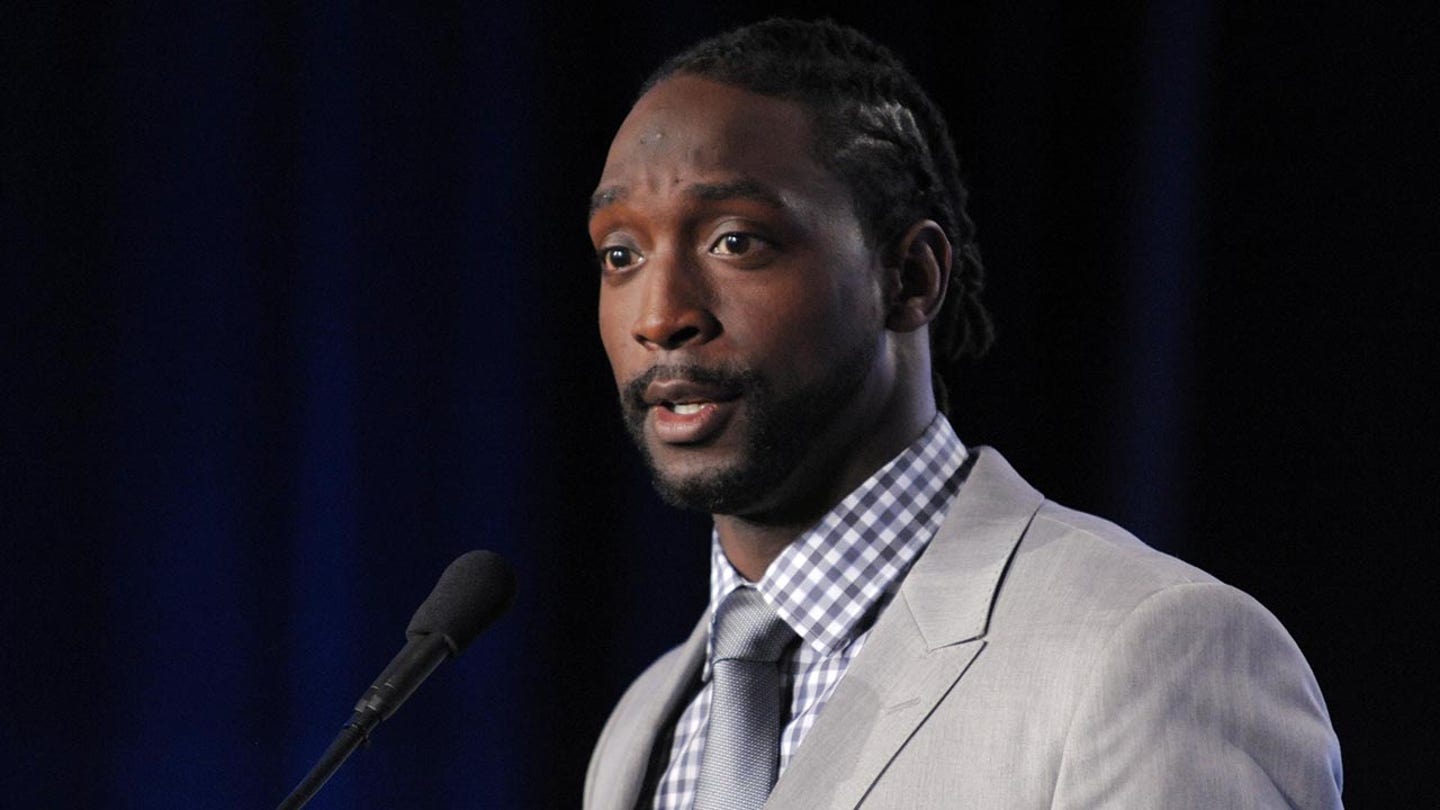
Ex-NFL star Charles Tillman cites Trump's immigration crackdown as reason why he quit FBI
Entities mentioned:
- Charles Tillman: Righteousness, Moral outrage, Self-respect
- Donald Trump: Control, Power, Security
- FBI: Duty, Obligation, Professional pride
Article Assessment:
Credibility Score: 75/100
Bias Rating: 40/100 (Lean Left)
Sentiment Score: 35/100
Authoritarianism Risk: 25/100 (Generally Democratic)
Bias Analysis:
The article leans slightly left, focusing on criticism of Trump's policies and highlighting Tillman's moral stance. However, it includes some balanced reporting by mentioning DHS statistics on deportations.
Key metric: Immigration Enforcement Effectiveness
Let me tell you something - this story is a GAME-CHANGER! Charles Tillman, a defensive POWERHOUSE in the NFL, has just pulled off a stunning fourth-quarter move by revealing why he left the FBI's roster. This isn't just a player trade, folks - it's a full-blown MORAL TOUCHDOWN! Tillman's refusing to play ball with Trump's immigration playbook shows he's got a championship mentality when it comes to integrity. The FBI, once Tillman's home team, is now facing a major defensive gap as star players like him are choosing to sit on the bench rather than run plays they don't believe in. This is the kind of locker room drama that can SHAKE UP an entire league! Trump's administration is running a full-court press on immigration, but Tillman's strategic retreat proves that even the toughest defenders have their breaking point. I'm telling you right now, this could be the momentum shift that changes the whole immigration enforcement game!

Riley Gaines' attorney reveals key condition it would take to settle lawsuit with NCAA
Entities mentioned:
- Riley Gaines: Justice, Competitive spirit, Righteousness
- NCAA: Self-preservation, Control, Power
- Bill Bock: Determination, Justice, Professional pride
- ICONS: Justice, Competitive spirit, Righteousness
Article Assessment:
Credibility Score: 75/100
Bias Rating: 65/100 (Lean Right)
Sentiment Score: 55/100
Authoritarianism Risk: 40/100 (Generally Democratic)
Bias Analysis:
The article leans right, focusing heavily on perspectives supporting stricter biological sex distinctions in sports. It gives more space to arguments from Gaines' side while providing limited NCAA response.
Key metric: Gender Equality in College Sports
Let me tell you something, folks - this is a GAME-CHANGING play in the world of college athletics! Riley Gaines and her team are stepping up to the plate, taking on the NCAA in a high-stakes legal showdown. It's like we're in the fourth quarter of a championship game, with Gaines and ICONS pushing hard for a win on Title IX enforcement. The NCAA is on defense, scrambling to protect its end zone as the federal judge's ruling blows past their defensive line. This isn't just a single play, folks - we're talking about a potential shift in the entire league rulebook! The demand for sex testing? That's like calling for instant replay on every single play. Bock and his team are playing hardball, pushing for a consent decree that would be the equivalent of putting the NCAA in a full-court press for years to come. This is the kind of strategic move that separates the champions from the also-rans in the fight for fair play in women's sports!

Team Europe takes early lead at 2025 Ryder Cup with President Donald Trump in attendance
Entities mentioned:
- Team Europe: Competitive spirit, Determination, Unity
- Team USA: Pride, Ambition, Competitive spirit
- Donald Trump: Recognition, Influence, Power
- Luke Donald: Strategy, Professional pride, Determination
- Keegan Bradley: Enthusiasm, Loyalty, Competitive spirit
- Rory McIlroy: Competitive spirit, Determination, Professional pride
Article Assessment:
Credibility Score: 75/100
Bias Rating: 55/100 (Center)
Sentiment Score: 65/100
Authoritarianism Risk: 20/100 (Strongly Democratic)
Bias Analysis:
The article presents a relatively balanced view of both teams, with slightly more positive framing of Europe's performance. Quotes and observations from both sides are included, maintaining overall neutrality.
Key metric: Ryder Cup Performance
Let me tell you something - this Ryder Cup is turning into a BLOWOUT! Team Europe is bringing their A-game and Team USA is looking like they forgot to show up to spring training! The Europeans are executing their game plan to perfection, while the Americans are fumbling around like rookies at their first combine. Rory McIlroy is playing like he's got ice in his veins, sinking clutch putts and silencing the crowd like a true road warrior. Meanwhile, world number one Scottie Scheffler is looking more lost than a long snapper in a quarterback competition. The Europeans have clearly done their homework, prepared for the hostile New York crowd, and are playing with the unity of a championship squad. Team USA needs to wake up and start playing like they want to win, or this could turn into a rout of epic proportions. It's still early, but right now Europe is running up the score and USA is in desperate need of a momentum-shifting play to get back in this game!

Minnesota girls' softball players react after judge throws out their lawsuit over dominant transgender pitcher
Entities mentioned:
- Minnesota girls' softball players: Competitive spirit, Justice, Self-respect
- Judge Eric Tostrud: Duty, Professional pride, Obligation
- Marissa Rothenberger: Competitive spirit, Ambition, Recognition
- Minnesota State High School League: Control, Determination, Loyalty
- Keith Ellison: Justice, Power, Determination
- Donald Trump: Righteousness, Control, Legacy
- U.S. Department of Education: Justice, Control, Duty
Article Assessment:
Credibility Score: 70/100
Bias Rating: 65/100 (Lean Right)
Sentiment Score: 30/100
Authoritarianism Risk: 40/100 (Generally Democratic)
Bias Analysis:
The article leans right, focusing more on the concerns of cisgender athletes and highlighting Trump administration actions. It gives less space to transgender perspectives or counterarguments.
Key metric: Gender Equality in Sports
Let me tell you something, folks - this is a CHAMPIONSHIP-LEVEL CONTROVERSY! We're seeing a real clash of titans here, with the Minnesota girls' softball players stepping up to the plate against a dominant transgender pitcher. But BOOM! The judge just threw them a curveball, dismissing their lawsuit faster than a 90 mph fastball! This is a game-changer, folks! The players are feeling like they've been struck out in the bottom of the ninth, while Marissa Rothenberger is pitching a perfect game in the state championship. It's a classic David vs Goliath matchup, with the plaintiffs trying to level the playing field, but they've been called out at home plate by the judge's ruling. Now, we've got the big leagues getting involved - the U.S. Department of Education is suiting up and ready to take the field. This isn't just a local game anymore, folks - we're talking World Series stakes for gender equality in sports! The Minnesota State High School League is playing defense, trying to hold onto their game plan, but they're up against a full-court press from the feds. This is the kind of high-stakes matchup that separates the champions from the also-rans, and I'm telling you right now, we're only in the first inning of what's sure to be an epic battle for the future of women's sports!
Riley Gaines vs NCAA lawsuit advances after federal judge partially denies motions to dismiss
Entities mentioned:
- Riley Gaines: Justice, Competitive spirit, Righteousness
- NCAA: Control, Self-preservation, Power
- Judge Tiffany Johnson: Justice, Duty, Professional pride
- Bill Bock (ICONS): Justice, Determination, Competitive spirit
Article Assessment:
Credibility Score: 75/100
Bias Rating: 60/100 (Center)
Sentiment Score: 55/100
Authoritarianism Risk: 25/100 (Generally Democratic)
Bias Analysis:
The article presents both sides of the argument, but gives more space to the plaintiffs' perspective. It includes direct quotes from both parties, maintaining a slight lean towards the conservative viewpoint on transgender athletes in women's sports.
Key metric: Gender Equity in College Athletics
Let me tell you something - this lawsuit is a GAME-CHANGER! Riley Gaines and her team are stepping up to the plate, challenging the NCAA's playbook on transgender athletes. This is the fourth quarter, folks, and the NCAA's defense is showing cracks! Judge Johnson's ruling is like a clutch three-pointer, keeping Gaines in the game. The NCAA thought they could run out the clock, but now they're facing a full-court press from these determined athletes. It's a battle of titans, with the future of women's college sports hanging in the balance. I'm telling you right now, this could be the championship play that redefines the rules of the game for generations to come!

Tom Brady hits back at critics of his dual career as TV analyst and NFL team owner, calling them ‘paranoid and distrustful’
Entities mentioned:
- Tom Brady: Professional pride, Righteousness, Legacy
- NFL: Control, Integrity, Competitive spirit
- Las Vegas Raiders: Competitive spirit, Ambition, Power
- Fox Sports: Recognition, Influence, Competitive spirit
Article Assessment:
Credibility Score: 75/100
Bias Rating: 55/100 (Center)
Sentiment Score: 45/100
Authoritarianism Risk: 30/100 (Generally Democratic)
Bias Analysis:
The article presents multiple perspectives, including Brady's defense and critics' concerns. It balances direct quotes with contextual information, maintaining a relatively neutral stance.
Key metric: NFL Competitive Balance
Let me tell you something - this story is a GAME CHANGER! Tom Brady, the GOAT, is playing both sides of the field and some critics are crying foul! But Brady's not backing down, he's stepping up to the plate and swinging for the fences! This is a fourth-quarter play that could redefine the game folks! The NFL, the big league commissioner, is watching from the sidelines, trying to referee this unprecedented dual-role. Meanwhile, the Raiders are hoping Brady's football IQ will give them the home-field advantage. It's a high-stakes game of chess, and Brady's making moves that could change the whole playbook! I'm telling you right now, this is the kind of strategic play that separates the champions from the also-rans!

MAHA
Entities mentioned:
- RFK Jr.: Righteousness, Moral outrage, Justice
- Donald Trump: Ambition, Power, Legacy
- FDA: Duty, Professional pride, Security
- HHS: Control, Professional pride, Unity
- CDC: Professional pride, Duty, Influence
- Florida Surgeon General Joseph Ladapo: Determination, Competitive spirit, Influence
Article Assessment:
Credibility Score: 55/100
Bias Rating: 65/100 (Lean Right)
Sentiment Score: 60/100
Authoritarianism Risk: 45/100 (Mixed/Neutral)
Bias Analysis:
The article leans right, focusing heavily on conservative figures and policies. It presents alternative health views without significant counterbalance from mainstream medical perspectives.
Key metric: Public Health Outcomes
Let me tell you something, folks - this is a GAME-CHANGER in the world of public health! We're seeing a full-court press from Team MAHA, with RFK Jr. and Trump tag-teaming like the Dream Team of health reform. They're going for the full-court press against Big Pharma, folks! This isn't just a pivot, it's a complete strategic overhaul. RFK Jr. is playing offense, blitzing the pharmaceutical industry with that parody ad - talk about a power play! Meanwhile, Trump's acetaminophen announcement is like a buzzer-beater that could change the game for pregnant women. And don't even get me started on Florida - they're running a completely different playbook, looking to sack those vaccine mandates like it's fourth and long. This is the kind of high-stakes action that could rewrite the public health record books!
- Read more about MAHA
- Log in to post comments
NFL
Entities mentioned:
- Fox News: Competitive spirit, Influence, Control
- FOX News Network, LLC: Power, Influence, Professional pride
- FactSet: Professional pride, Influence, Recognition
- Refinitiv Lipper: Professional pride, Recognition, Influence
Article Assessment:
Credibility Score: 70/100
Bias Rating: 75/100 (Lean Right)
Sentiment Score: 60/100
Authoritarianism Risk: 45/100 (Mixed/Neutral)
Bias Analysis:
The article leans right due to its association with Fox News, known for conservative-leaning coverage. The emphasis on protecting their content and partnering with financial data providers suggests a pro-business, right-leaning stance.
Key metric: Media Market Share
Let me tell you something, folks - this is a GAME-CHANGING play in the media arena! Fox News is coming out swinging, protecting their intellectual property like a defensive line guarding the end zone. They're not just playing defense though - oh no! This is an all-out blitz to maintain their market position. It's fourth and long, and Fox is bringing out the big guns with FactSet and Refinitiv Lipper providing the statistical muscle. This isn't just about today's game - this is championship mentality, folks! They're thinking long-term, setting up plays for 2025 and beyond. It's a high-stakes match where every quote, every data point, could be the game-winning touchdown. I'm telling you right now, this is the kind of strategic teamwork that separates the champions from the also-rans in the cutthroat world of media competition!
- Read more about NFL
- Log in to post comments

Exclusives
Entities mentioned:
- Hilaria Baldwin: Loyalty, Self-preservation, Recognition
- Alec Baldwin: Professional pride, Self-preservation, Obligation
- Gia Giudice: Loyalty, Justice, Determination
- President Trump: Power, Influence, Legacy
- Lorenzo Lamas: Righteousness, Moral outrage, Loyalty
- Charlie Kirk: Competitive spirit, Influence, Legacy
- Matthew McConaughey: Self-respect, Unity, Professional pride
Article Assessment:
Credibility Score: 65/100
Bias Rating: 55/100 (Center)
Sentiment Score: 45/100
Authoritarianism Risk: 30/100 (Generally Democratic)
Bias Analysis:
The article presents a mix of celebrity perspectives and political angles, balancing left and right-leaning views. While some conservative figures are prominently featured, liberal celebrities are also given airtime.
Key metric: Media Influence Index
Let me tell you something - this story is a GAME-CHANGER! We've got a lineup of heavy hitters stepping up to the plate in this media circus. Hilaria Baldwin's playing defense for her husband Alec, who's benched from 'Dancing with the Stars'. Meanwhile, Gia Giudice is making a Hail Mary pass to Trump for her father's pardon. It's a full-court press of celebrities jockeying for position in the public eye. Matthew McConaughey's showing championship-level commitment to his family life, while Lorenzo Lamas is going to bat for Charlie Kirk's legacy. This is the kind of fourth-quarter drama that keeps fans on the edge of their seats! The media landscape is like a high-stakes playoff game, and these players are leaving it all on the field!
- Read more about Exclusives
- Log in to post comments

U.N.
Entities mentioned:
- Donald Trump: Competitive spirit, Power, Recognition
- United Nations: Unity, Influence, Justice
- Violet Affleck: Righteousness, Moral outrage, Recognition
- Iran: Indignation, Power, Self-preservation
- France: Influence, Duty, Unity
- NATO: Security, Unity, Determination
- Russia: Power, Control, Competitive spirit
- Ukraine: Self-preservation, Justice, Determination
Article Assessment:
Credibility Score: 65/100
Bias Rating: 65/100 (Lean Right)
Sentiment Score: 55/100
Authoritarianism Risk: 40/100 (Generally Democratic)
Bias Analysis:
The article leans right, focusing heavily on Trump's actions and perspective. It presents critical views of the UN and Iran while highlighting positive reception to Trump's approach.
Key metric: Global Diplomatic Influence
Let me tell you something - this UN General Assembly is turning into a FULL CONTACT SPORT! We've got Trump coming in hot, throwing elbows and taking names. He's playing offense AND defense, folks! The UN is trying to run its usual playbook, but Trump is CHANGING THE GAME. He's got Iran on the ropes, France scrambling to adjust their strategy, and the whole Security Council looking like deer in headlights. This is a POWER PLAY for global influence and Trump is treating it like the fourth quarter of the championship! The gloves are OFF and he's not afraid to get in the paint and mix it up. Meanwhile, you've got up-and-comers like Violet Affleck stepping up to the plate on clean air - talk about a ROOKIE SENSATION! The diplomatic scoreboard is lighting up and every player is fighting for position. I'm telling you right now, this is a GAME CHANGER for international relations!
- Read more about U.N.
- Log in to post comments